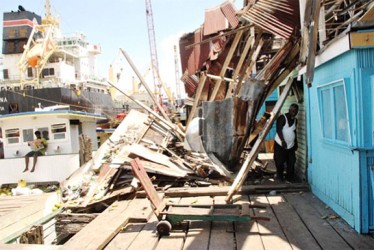On Monday when Stabroek Business visited the area of the Stabroek Market Wharf where a section of the roof had collapsed more than a week earlier, flattening a few stalls in the process, other vendors were still trading in the shadow of the havoc, seemingly indifferent to the danger of the rotting roof raining down on them.
It is not a matter of if but when another section of the badly deteriorated roof would fall but you would have been unable to tell if you had chosen to judge from the seeming indifference of the remaining vendors who were simply getting on with their lives, some trading from what they felt to be somewhat safer vantage points and others removing ‘load’ from the small boats that had made their way across the Demerara River.
On the whole and even if you rule out the collapsed section, the roof is an eyesore, remediable only through extensive and costly repairs and renovation and the Municipality’s budget almost certainly does not allow for that. More than that the scene mirrors the manner in which small urban vendors have always been treated, mostly herded into desolate corners and left there to fend for themselves. Those vendors, still trading in the unsafe space under the collapsing roof of the Stabroek Stelling have much to say about their situation but their circumstances do not allow them to complain. They must soldier on.

Another section of the roofing had collapsed in September and before that another section a few years earlier. The condition of the Stabroek Stelling is not so much a hazard as it is a festering sore, a monument and protracted official indifference to the well-being of the small business community. If you are told that these vendors – scores of them – actually pay a fee – four thousand dollars per month – to trade in this dangerous space you would be inclined to doubt what you are told; and yet the Municipality shamelessly collects the vending fees.
The plight of the vendors is perhaps the most poignant manifestation of the indifference of a clutch of business support organisations that have grown adept at professing a commitment to helping to grow small business but, in the final analysis, doing little of substance to keep their word. Up to Monday there had been no word from the private sector about lobbying for the affected vendors to be afforded adequate and appropriate optional trading spaces. On Monday, the vendors themselves could say little about the details of a publicly announced plan to relocate at least twenty of them to Merriman Mall.
The calamity is, perhaps above all else, a manifestation of a Georgetown Municipality that has long been virtually crippled by the machinations of a poisoned political culture. In October, the controversial Acting Town Clerk Carol Sooba had reportedly scuttled a meeting convened by the Mayor and City Council to affect a range of issues affecting the vendors occupying the wharf, not least the rotting roof. There had been talk about plans to relocate the vendors though that turned out to be no more than the customary lip service. In the past the Council had asked the vendors to relocate; this time, they say, there has been no communication.
It is a complex situation to which no short-term remedy would appear to be in sight. On the one hand it would be foolhardy to continue to expose the scores of vendors and shoppers who use the wharf to such obvious danger. On Monday, however, the danger was only part of what was on the vendors’ minds. Their other seemingly no less pressing concern was with the economic lifeline which the dilapidated and dangerous trading space provides.
The posture of the authorities is an even more worrying concern. The prevailing condition of brinkmanship between the municipality and the government has left the vendors out in the cold and the best that can be said is that the vendors continue to dwell in the shadow of a disaster. It is their livelihoods and the welfare of their families, however, that is uppermost in their minds.




